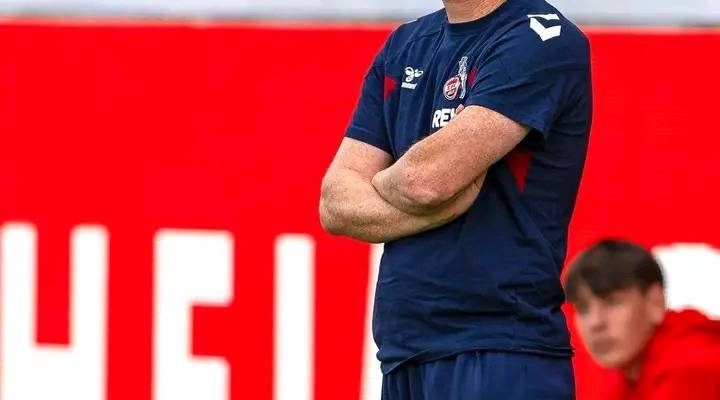Without knowing every detail of the “severe training scandal” in question, we have to read between the lines, compare with past disciplinary precedents in football, and weigh what’s at stake. The headline is sensational: three key players suspended. That immediately raises the stakes for team dynamics, public perception, competitiveness, and internal discipline. Is Timo Schultz making a bold move, or walking a tightrope? Probably both.
First, let’s consider what such a decision signals. When a coach suspends important squad members, he is sending a message: no one is above the rules. In an environment where squad morale, ego, star status, and delicate pecking orders often make discipline difficult, Schultz is staking out moral ground. He’s saying that standards matter, that collective culture matters, and that even high-performing individuals must respect the system. In times of crisis, that kind of statement can galvanize others. Players who may have been complacent, or skirting boundaries, suddenly see that the leash is short, and that accountability is real.
On the flip side, when those suspended are “key” players, the coach risks losing firepower, cohesion, match fitness, and possibly results. If the punishments drag on, the team may suffer on the pitch. Moreover, fans and media may turn critical: “Is he punishing for the principle, or simply weakening the team?” The optics are delicate. If he is perceived to lash out, be rigid, or misjudge, his authority could crack under stress.
Let’s imagine what the “training scandal” might be—or draw analogies from comparable cases. Perhaps it was a breach of internal protocol: a late arrival, disregard of fitness requirement, insubordination, perhaps even off-field misconduct that spilled into training context (e.g. fighting, showing up drunk, skipping sessions). Whatever it was, to warrant suspending multiple first-team players, it must be serious in his view—or he must feel that the culture was slipping, such that a high-impact correction was necessary before further decay. The fact that three were involved suggests it wasn’t a one-off error, but perhaps a breakdown of discipline among a clique or a misjudgment that spread.
In the short term, this is a gamble. The coach has to manage two contradictory pressures: performance and control. If he suspends too long, the team may stumble; if he relents too quickly, the message is undermined. He needs to calibrate duration, transparency, and the path to rehabilitation. He must show that this is not arbitrary revenge but a structured process: apology, restitution, rehabilitation, reentry to the squad. Players need to feel there is a route back, otherwise the move breeds resentment, division, and may lead to mutiny or exits.
Also, the way he handles the media and internal communication is crucial. If Schultz is ambiguous, silent, or seems vindictive, the discontent will grow. In contrast, if he speaks frankly: “I asked these players to own their behavior, to make amends, to reaffirm commitment—those who show genuine attitude change will reearn their place,” he gains moral high ground. Transparency (within limits) can win over fans and neutral observers.
There’s historical precedent. Coaches who discipline stars sometimes come off as resolute. Think of José Mourinho benches or sidelines big names when they cross lines; of Jürgen Klopp disciplining players for missed meeting or internal breaches; of other Bundesliga or European coaches who drop players to reinforce culture. Often the gamble pays off: the team tightens, others step up, the unit becomes more resilient. But there are cautionary tales—when the results don’t follow, the backlash is harsh, and the coach is blamed for weakening the team in a delicate moment.
In Schultz’s specific context, we must factor his tenure, his trust capital, and the institutional stability at FC Cologne. If he is relatively new, or under pressure already, he has less margin for error. If fans, management, and media are already questioning parts of his philosophy or results, such a bold move may be read as desperation or overreaction, rather than principled firmness. If, however, Schultz already commands internal respect, has loyal players behind him, and has established some moral authority, he has a better chance of weathering criticism.
Also consider team composition. If those suspended are too critical—say, the main playmaker, the defensive anchor, the leading scorer—then the tactical and performance loss might outweigh the disciplinary gain. But if the team has depth and flexibility, or lesser-used players waiting in the wings, then the punishment becomes less costly, and the challenge becomes an opportunity: others step up, competition intensifies, squad character hardens.
Another factor is timing. Is this before a crucial stretch of games? A relegation fight? A promotion push? In high-stakes moments, losing key contributors is riskier. But if the scandal emerged during a lull or “off week,” or after a poor run where morale was waning anyway, such a shake-up might be precisely what the team needs. Disrupting a failing status quo sometimes flips the switch.
We must also look at fan and media sentiment. Football clubs are public institutions. Fans will demand loyalty to stars, but also crave discipline and identity. If fans believe the suspended players were privileged, sloppy, or disrespectful, they may applaud Schultz. If fans perceive the move as heavy-handed, they’ll demand reversals, question judgment, and put pressure on management. Media will dissect every angle: the nature of the scandal, whether KTM (key to management) players are being targeted, whether the coach is scapegoating, and whether this is power assertion.
Another risk: fragmentation of the locker room. If the suspended players are invested figures or leaders, their absence may leave a vacuum or stir factions. Teammates may feel torn: support Schultz or side with their sidelined colleagues. Trust can fracture. The coach must manage relationships delicately. He must reassure those not involved, prevent victimization narratives, monitor morale, and ensure the daily environment doesn’t sour. Otherwise, the very culture he wants to preserve could erode from within.
Yet, when discipline is earned rather than imposed, it can strengthen a coach’s standing. If after the suspension, those players return (or even new ones emerge) and performances improve, then Schultz’s move is retrospectively seen as courageous and game-changing. He becomes the man who would not flinch, who sacrified short-term comfort for long-term integrity.
Of course, risks remain. If results deteriorate, critics will say he shot himself in the foot. If the suspended players quietly demand transfers, the team may lose talent and regret the choice. If the players’ punishment becomes drawn out, or lacks clarity, it breeds rumor, locker-room gossip, fractures. If management does not firmly back the coach in this move, he becomes isolated, undermined, and vulnerable.
Given all that, Schultz is walking a high-wire. But perhaps that’s what his position demands. If the scandal was indeed serious and threatened the club’s internal order, then a weak or moderate reaction might cultivate permissiveness and further indiscipline. In that sense, a bold disciplinary stand may be precisely the reset the team needs. The question is: can Schultz manage the fallout—tactically, psychologically, politically—without tipping the balance toward collapse?
To me, the decision leans toward bold leadership rather than reckless risk. But the margin is thin. His success depends on execution: clarity of the red lines, fairness in process, opportunities for redemption, and the squad’s ability to absorb the temporary weakness. If handled well, he could convert this crisis into a defining moment of authority and cohesion. If handled badly, it could fracture trust, fizzle morale, and accelerate decline.
In the end, a coach’s job is not just tactics; it’s culture, control, relationships. By suspending these players, Schultz is asserting control—but with that assertion comes responsibility for every consequence that follows. Whether he is applauded or criticized will depend less on the boldness of the move than on the wisdom with which he manages the aftermath.



